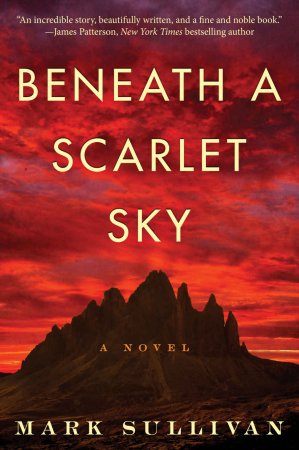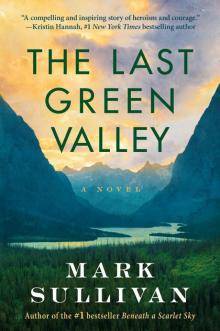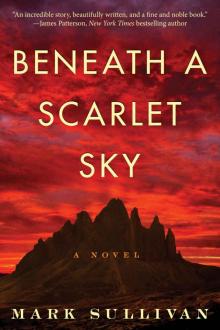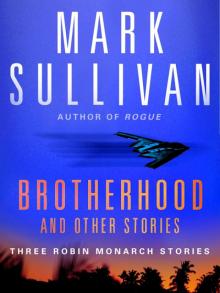- Home
- Mark Sullivan
Beneath a Scarlet Sky: A Novel Page 6
Beneath a Scarlet Sky: A Novel Read online
Page 6
Then the priest stood, put two fingers in his mouth, and whistled sharply. The room quieted.
Father Re said, “Dish duty: report to Brother Bormio. The rest of you: the tables are to be cleared and wiped down, and then you have to study.”
Mimo and the rest of the boys seemed to all know the routine, and they got to their chores with surprisingly few grumbles. Pino retrieved his rucksack and followed Father Re past the entrances to two big dorm rooms to a narrow cubicle with bunk beds built into the wall and a curtain across the front.
“It’s not much, especially for someone your size, but it’s the best we can do for the moment,” Father Re said.
“Who else is with me?”
“Mimo. He’s had it to himself until now.”
“He’s going to be so happy.”
“I’ll leave you two to figure things out,” the priest said. “You are older than the others, so I don’t expect you to follow their rules. So here are yours. You must climb every day on a route I prescribe. And you must study at least three hours every day, Monday through Friday. Saturdays and Sundays are your own. Does that work?”
It seemed like a lot of climbing, but Pino loved being in the mountains, so he said, “Yes, Father.”
“I’ll leave you to unpack, then,” Father Re said. “It’s good to have you here again, my young friend. I can see now that having you around might prove to be a big help.”
Pino smiled. “It’s good to be back, Father. I missed you and Motta.”
Father Re winked, rapped on the door frame twice with his cane, and left. Pino cleared two shelves and put his brother’s clothes on the top bunk. Then he emptied his rucksack and arranged his books, clothes, and the pieces of his beloved shortwave radio, which he’d hidden among his clothes despite the danger he’d have been in if the Nazis had searched his gear. Lying on the bottom bunk, Pino listened to a BBC dispatch on Allied advances, then dropped off into nothingness.
“Hey,” Mimo said an hour later. “That’s where I sleep!”
“Not anymore,” Pino said, rousing. “You’re top bunk now.”
“I was here first,” Mimo protested.
“Finders keepers.”
“My bunk wasn’t lost!” Mimo shouted before lunging at Pino and trying to drag him off the bed.
Pino was much stronger, but Mimo had a warrior’s heart and never knew when to admit defeat. Mimo bloodied Pino’s nose before Pino could pin him to the floor.
“You lose,” he said.
“No,” Mimo sputtered as he squirmed, trying to get free. “That’s my bed.”
“Tell you what. When I’m gone on weekends, you can use it. Four or five days a week it’s mine, and two to three it’s yours.”
That seemed to calm his brother. “Where are you going on weekends?”
“To Madesimo,” Pino said. “I have a friend there who will teach me to fix cars and to drive them like a champion.”
“You are so full of salami.”
“It’s true. He gave me a ride up from the train station. Alberto Ascari. The greatest driver I’ve ever seen. His father was European champion.”
“Why would he teach you?”
“It’s a trade. I’m teaching him to ski.”
“Think he’d teach me to drive, too? I mean, I ski better than you.”
“You have vivid dreams, little brother. But how about I teach you what the great Alberto Ascari teaches me?”
Mimo thought about that, and then said, “Deal.”
Later, when they’d turned off the light and Pino had buried himself under the covers, he wondered whether Milan was being bombed, how his family was, and whether Carletto was sleeping out in that meadow on the hill or if he was awake and watching more of the city go up in fire and curling smoke. And for a second he thought of Anna leaving the bakery, that moment he first caught her attention.
“Pino?” Mimo said as he’d begun to drift off.
“Yeah?” Pino said, annoyed.
“Do you think I’ll grow soon?”
“Any day now.”
“I’m glad you’re here.”
Pino smiled despite the swelling in his nose. “I’m glad I’m here, too.”
Chapter Six
Pino was dreaming of car racing when Father Re shook him awake the next morning. It was still dark out. The priest was silhouetted in the light of a handheld lantern he’d set on the floor outside the brothers’ narrow room.
“Father?” Pino whispered, groggily. “What time is it?”
“Four thirty.”
“Four thirty?”
“Get up and dress for a hike. You need to get in shape.”
Pino knew better than to argue. Though the priest had none of his mother’s bravado, he could be as stubborn and demanding as Porzia on her toughest day. With people of this nature, Pino had long ago decided, it was better to get out of their way or go along for the ride.
He grabbed his clothes and went to the washroom to dress. Heavy canvas-and-leather shorts, thick wool socks that came up over his calves, and a pair of brand-new stiff boots his father had bought him the day before. Over his thin loden-green wool shirt, he wore a dark wool vest.
The dining hall was empty except for Father Re and Brother Bormio, who’d cooked him eggs and ham and toast. While Pino ate, the priest gave him two jugs of water that he wanted him to carry in his rucksack. There were also a large lunch and an oilskin anorak in case of rain.
“Where should I go?” Pino said, fighting back a yawn.
Father Re had a map on hand. “Take the easy way to the Passo Angeloga below Pizzo Stella. Nine kilometers there. Nine kilometers back.”
Eighteen kilometers? Pino hadn’t walked that far in a long time, but he nodded.
“Go straight to the pass and try to stay out of sight of others on the trail unless it’s unavoidable.”
“Why?”
Father Re hesitated. “Some people from the villages around here think they own the Angel’s Step. It’s easier if you just stay away from them.”
Pino felt confused by that as he set out on a full stomach in the low light before dawn, walking along the trail that led southeast from Casa Alpina. The trail meandered in an easy, long traverse that followed the contour of the mountain, before slanting and losing elevation on the south flank of the Groppera.
By the time he’d neared the bottom, the sun had risen and was shining on the peak of Pizzo Stella ahead and to his right. The air smelled so fragrant there with pine and balsam that it was hard for him to recall the rank scent of bombs.
Pino stopped there, drank water, and ate half of the ham, cheese, and bread Bormio had packed for him. He stretched a bit, looking off and thinking about Father Re’s warning to try to stay out of sight of people who thought they owned the pass. What was that about?
Shouldering his pack once more, Pino started up the switchback trail that led to the Passo Angeloga, the Angel’s Step, the southern pass toward Val di Lei. Until that point, he had been cutting down a long sidehill. Now he was ascending almost constantly, taking big lungfuls of thin air while his calves and thighs burned.
The trail soon left the forest, and trees dwindled to a few scraggly, wind-gnarled juniper bushes that clung to rocky outcroppings. The sun broke over the ridge, revealing other ground shrubs, mosses, and lichen—all muted oranges, reds, and yellows.
Three-quarters of the way up to the pass, clouds started to scud across the sky, hanging up on the pinnacle of the Groppera far above Pino and to his left. The tundralike terrain gave way to rock and scree fields well below the saddle. Though there was still a solid trail, loose rocks slid beneath his new boots, the stiff leather of which began to rub at his heels and toes.
His plan had been to reach the stacked-rock cairn at the middle of the Angel’s Step, and remove his shoes and socks. But three hours into his hike, the clouds grew large, ominous, and gray. The wind picked up. To the west, he could see the slanting charcoal lines of a storm.
Putting on the anorak, Pino pr
essed on toward the cairn at the crossing of several trails at the top of Passo Angeloga, including one that led toward the shoulder of the Groppera, and another toward Pizzo Stella. Fog came swirling in before he reached the stack of rocks.
The rain followed, a few drops at first, but Pino had been in the Alps often enough to sense what was coming. Ditching any idea of checking his feet or having something to eat, he touched the cairn and pivoted into the wind and the building storm. The rain quickly turned to marble-sized hail that battered at his hood and caused him to throw up his forearm to protect his eyes as he dropped back down the mountain.
Hail burst against the rocks and loose stone on the trail, glazing them and forcing Pino to move slower. The hail died with the wind, but the rain kept on in a steady downpour. The trail became an icy sluice box. It took Pino more than an hour to reach the first trees. He was soaked. He was chilled. His feet had blistered.
When he reached where the trail split and climbed back toward Motta and Casa Alpina, he heard shouting from ahead and down toward Soste. Even at a distance, even through the rain, he could tell that the voice was a man’s and that he was angry.
Pino remembered Father Re’s warning about being seen and felt his heart race as he turned and ran.
Hearing the man’s cries turn to outrage behind and below him, Pino sped on the uphill trail into the trees and didn’t slow for almost fifteen minutes. His lungs felt like they’d burst. He stood hunched over, gulping for air and feeling nauseated from the exertion and the altitude. But he no longer heard shouting, just the rain dripping from the trees and somewhere far below, a faint train whistle. As he pressed on, he felt good and laughed at having eluded the man.
The rain was starting to let up when Pino reached Casa Alpina. He’d been gone five hours and fifteen minutes.
“What took you so long?” Father Re asked, appearing in the front hallway. “I had faith, but Brother Bormio was starting to get worried.”
“Hail,” Pino said, shivering.
“Strip to your underwear and go by the fire,” Father Re said. “I’ll send Mimo to fetch you some dry clothes.”
Pino took off his boots and socks, grimaced at the nasty blisters, all of which had popped and were a livid red.
“We’ll put iodine and salt on those,” Father Re said.
Pino cringed. When he was down to his undershorts, he chattered, hugged his chest, and hobbled into the dining hall where all forty boys were quietly studying under the watchful eye of Brother Bormio. The second they saw mostly naked Pino doing his awkward, exaggerated walk toward the fireplace, they broke into howls of laughter, with Mimo laughing hardest of all. Even Brother Bormio seemed to find it funny.
Pino waved them off, didn’t care, just wanted to be as close as he could get to that fire. He stood on the warm hearth for several long minutes, shifting his body one way and then another until Mimo arrived with dry clothes. When Pino had dressed, Father Re came over with a mug of hot tea and a bowl filled with warm salt water for his feet. Pino drank the tea thankfully and had to grit his teeth when he plunged his feet into the salt water.
The priest asked Pino for a complete rundown of the morning’s exercise. He told Father Re all about it, including his encounter with the angry man from Soste.
“You didn’t get a look at his face?”
“He was kind of far, and it was raining,” Pino said.
Father Re thought about that. “After lunch, you can take a nap, and then you owe me three hours of studying.”
Pino yawned and nodded. He ate like the proverbial horse, limped down to his bunk, and passed out cold the moment his head hit the pillow.
The following morning, Father Re shook him awake an hour later than he had the previous day.
“Get up,” he said. “You have another climb ahead of you. Breakfast in five minutes.”
Pino moved, felt sore everywhere, but his blisters were better for the salt bath.
Still, he dressed as if he were in a fog as thick as the one he’d encountered the day before. He was a growing teenage boy. He liked to sleep a lot and couldn’t stop yawning as he gingerly made his way in stocking feet back to the dining hall. Father Re was waiting with food and a topographical map.
“I want you to flank to the north today,” Father Re said, tapping the wide lines that defined the bench at Motta, including the cart track that dropped down the mountain to Madesimo, and then a series of tight lines indicating increasing steepness beyond it. “Stay high crossing the face here and here. You’ll find game trails that will help you cross this ravine. And eventually you’ll end up over here in this meadow up the slope from Madesimo. Would you recognize it?”
Pino stared at the map. “I think so, but why don’t I avoid that face, drop down to Madesimo on the two-track, and then climb straight up to that spot? It would be faster.”
“It would be,” Father Re said. “But I’m not interested in your speed, just that you can find your way and not be seen.”
“Why?”
“I have my reasons, which I’ll keep to myself for now, Pino. It’s safer that way.”
That only deepened Pino’s confusion, but he said, “Okay. And then back?”
“No,” the priest said. “I want you to climb into the bowl of the north cirque. Look for the game trail that goes up and over into Val di Lei. Don’t climb it unless you feel you’re ready. You can come back and try another day.”
Pino sighed, knowing he was in for another rough hike.
Weather wasn’t a factor. It was a beautiful late September morning in the southern Alps. But Pino’s muscles and taped blisters nagged at him as he maneuvered across rocky catwalks on the western face of the Groppera and through a ravine choked with old logs and avalanche debris. It took him more than two hours to reach the meadow Father Re had shown him on the map. He started uphill through deep alpine grasses, already turned paler than brown.
Like Anna’s hair, Pino thought, examining the hairs that surrounded the seed pods, mature, and ready to spread on the wind. He remembered Anna on the sidewalk beyond the bakery, and how he’d rushed to keep up with her. Her hair was just like this, he decided, only riper, lusher. As he climbed on, the soft stalks of grass sliding across his bare legs made him smile.
Ninety minutes later he reached the north cirque. It looked like the interior of a volcano, with three-hundred-meter sheer walls to his left and right and ragged, sharp stone teeth along the top. Pino found the goat trail and thought about climbing it, but decided he wouldn’t be worth a damn up there with his feet feeling like ground meat. Instead, he dropped straight downhill to Madesimo.
He reached the village at one o’clock that Friday afternoon, went to the inn, ate, and reserved a room. The innkeepers were kind people with three children, including seven-year-old Nicco.
“I’m a skier,” Nicco boasted to Pino while he wolfed down his food.
“I am, too,” Pino said.
“Not as good as me.”
Pino grinned. “Probably not.”
“I’ll take you skiing when it snows,” the boy said. “Show you.”
“I look forward to that,” Pino said, and tousled Nicco’s hair.
Stiff, but no longer ravenous, Pino went in search of Alberto Ascari, but the engine repair shop wasn’t open. He left a note telling Ascari of his plan to return in the evening, and hiked back to Casa Alpina.
Father Re listened closely to Pino’s description of crossing the cliffy face of the Groppera, and his decision not to climb the north cirque.
The priest nodded. “You don’t want to be in the rocks if you’re not ready for them. You will be soon enough.”
“Father, after I’m done studying, I’m going to go down to Madesimo to spend the night and see my friend Alberto Ascari,” Pino said.
When Father Re squinted, Pino reminded him that weekends were his own.
“I did say that,” the priest said. “Go, have fun, and rest up, but be ready to start again Monday morning.”
/> Pino took a nap and then studied ancient history and math, before reading the play The Giants on the Mountain by Luigi Pirandello. It was past five when he started back down the trail to Madesimo in his street shoes. His feet were killing him, but he hobbled all the way to the inn, checked in, spent time regaling little Nicco with his ski-racing stories, and then went to Ascari’s uncle’s house.
Alberto opened the door, welcomed him, and insisted he come in for dinner. His aunt was a better cook than Brother Bormio, which was saying something. Ascari’s uncle loved to talk about cars, so they got on famously. Pino gorged himself to the point where he almost fell asleep during dessert.
Ascari and his uncle helped him back to the hotel, where Pino kicked off his shoes, flopped on the bed, and slept in his clothes.
His friend knocked on his door right after dawn.
“Why are you up so early?” Pino asked, yawning. “I was going to—”
“You want to learn to drive or not? The next two days are supposed to be clear, no rain, no snow, so I’m willing to teach you. You pay for petrol, though.”
Pino scrambled for his shoes. They ate a quick breakfast in the hotel dining room and then went out to Ascari’s Fiat. For the next four hours, they drove above Campodolcino on the road to the Splügen Pass and Switzerland.
On that winding route, Alberto taught Pino how to read the gauges and use them, and how to adapt to terrain, elevation, and direction changes. He showed Pino how to drift through some turns and to knife through others, and how to use the engine and the gears rather than the brakes to keep the car under control.
They drove north until they could see German checkpoints and the Swiss border beyond and turned around. On the way back to Campodolcino, two Nazi patrols stopped them, demanding to know what they were doing on the road.
“I’m teaching him to drive,” Ascari said after they’d turned over their papers.
The Germans didn’t seem happy about it, but waved them on.
When they returned to the hotel, Pino was as excited as he’d been in a long time. What a thrill it was to drive a car like that! What an amazing gift he’d been given to learn from Alberto Ascari, the future European champion!

 Beneath a Scarlet Sky
Beneath a Scarlet Sky The Last Green Valley
The Last Green Valley Beneath a Scarlet Sky: A Novel
Beneath a Scarlet Sky: A Novel Brotherhood and Others
Brotherhood and Others The Purification Ceremony
The Purification Ceremony